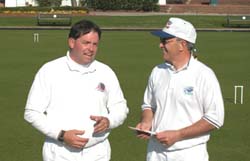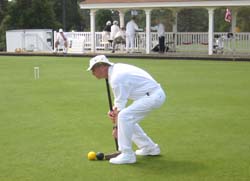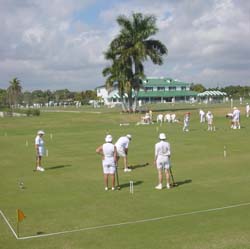

|
Back to |
| The Front Page |
| News & Features |

|
The people's purse: 2003 Croquet Fever Competition Series |
|||||||
|
by Bob Alman with Danny Huneycutt Posted March 25, 2003
|
|
||||||
He calls the tour "Croquet Fever," and even if you're a handicap 14, you can go for the gold. The sale of broadcast rights, endorsements, and sponsorships is the foundation of purse tournaments in mainstream sports, but that kind of cash plays no part in Danny Huneycutt's 11-tournament tour. The loot comes from the players themselves, with 90 percent of the moderate entry fees, after expenses, going into the pot. The top players don't get to hog all the cash, either. Much of the prize money goes into the top flight, but the four-plus handicap group also gets a share, and even the 10-plus handicaps. The highest placers in all three flights in the 10 2-day qualifying tournaments get to play in the Croquet Fever final, at Pinehurst, North Carolina, the second weekend in October, where the series began in March with the first qualifier. All the events are on weekends, enabling working people to play. And they are all in the Southeastern croquet boom states, at beautiful venues stretching from Pinehurst in North Carolina to the National Croquet Center in South Florida.
After a lifetime of on-again off-again excursions into backyard croquet, Danny Huneycutt of Lexington, North Carolina, decided to organize a croquet club in October of 2001 with his neighbor and croquet buddy Jon Essick. During the prior 15 years Huneycutt and Essick, without knowing each other, had followed similar croquet paths, playing backyard 9-wicket croquet and advancing to different versions of 6-wicket after USA Today published an article about the legendary Kentucky tobacco farmer and croquet player Archie Burchfield. "Even though we lived 3 miles apart," Huneycutt recalls, "our paths never crossed until a mutual friend introduced us. It was Mike Lambros, the local high school athletic director. He asked us to teach his Lifetime Sports PE class how to play croquet."

|
| Danny Huneycutt (left) presents Open Flight award to Rick Wilhoite in the first qualifing tournament at Pinehurst in early March. |
Penwell introduced them to USCA and Golf Croquet rules, and they were off and running. Penwell encouraged Huneycutt to get official USCA status for their club so its members could play in sanctioned tournaments. The leap of faith was made and Meadows Mallet Club, based at the home of Casper and Becky Essick, was officially formed in January 2002. These working people - mostly 30-somethings - often played until midnight under limited lighting, such was their growing passion for the game.
Some of the players started competing in tournaments, and the members decided to play in the North Carolina Club Team Championships. They sent five teams to Linville in various divisions, and four advanced to the semifinals. The new club placed third in the state - a notable achievement in what has unquestionably become the most fertile seedbed of players and clubs in America.
In July of 2002, the club decided to mentor the Arbor Acres Methodist Retirement Community in Winston-Salem. The number of regular players of USCA rules in the community has grown from five, with twelve additional Golf Croquet players.
In March of 2003, Huneycutt malleteers brought a second high school into their development program.

|
| Wayne Synan of Virginia made it to the semi-finals in the top flight at Pinehurst. |
But one thing vexed Huneycutt: Not many of his players were willing to compete in tournaments. He asked them why. "Too expensive," some said. "Too long," others said. "We're working people," most said. "More like a party than a sport," still others commented. And last, "Tournaments are only for the best players."
Huneyicutt, like any saavy developer, actually listened to these comments and put together a program that took these observations into consideration.
To nail down the point, he explains, "Most of our players are 19 to 45 years old, low to middle income, with kids at home or college. They'd like to play more tournaments but with little league, work and bills they don't have the time to do more than one or at the most two one regular tournaments a year." (By "regular," Huneycutt means the standard events of four, five, or six consecutive days.)
Huneycutt gives much of the credit for the final form of the "Croquet Fever" series to club member Steve Summer. Summer has extensive knowledge and experience with of the Bass Masters fishing series, and many of the elements of the fishing series are incorporated into the "Fever" format.
The series of USCA sanctioned tournaments that will begin March 8, 2003 at Pinehurst is carefully designed to involve players of all handicap levels in tournament croquet that is affordable in terms of both time and money. Because the time and money commitment is modest, says Huneycutt, "The weekend tournament is a great tool for club mentors to involve their new players in tournament play. What stands out the most after participating in croquet this past year is the friendships we've developed, friendships that I believe will last beyond my playing days.
Huneycutt is pretty sure the social aspect of croquet - even competitive croquet - is at least as important as the game: "I want everyone to have the opportunity to meet a group of people that open their arms and assume you are a friend from the first time you meet them." For some reason no one can precisely explain, croquet is made-to-order as the ideal social calisthenic.
As for the need for cash prizes, not even Huneycutt can offer a completely rational reason why it's needed. But we all know that cash is a universal measurement of significance and achievement - from the gentleman's wager on a horse race to the pile you win at Saturday night's brew-sodden poker game.You don't display the cash on a table or on the wall, it's true. But on the other hand, you don't have to hide it in the closet either with dozens of other ugly trophies. All in all, cash is a great trophy, it turns out, and "Croquet Fever" has plenty of cash to pass out.
As a matter of fact, Huneycutt predicts that his homespun tour will account for at least half the total purses in croquet paid out in 2003 - in the scale of things, quite an achievement, as the total worldwide payout in recent years has been well under $30,000. Huneycutt's tour got off to a good start with the opener at Pinehurst generating more than $1400 in prize money. Multiply that only eleven times and Huneycutt's goal is already in the bag.

|
| The Southernmost venue is the National Croquet Center, where players can stay over for a day of bonus play on Memorial Day after the tournament ends. |
For 2003, Croquet Fever is limited to American rules in the Southeastern states. Want to play? Want to win a cash prize? Here's all you need to know to register:
All the tournaments are USCA sanctioned and two days in length, Saturday and Sunday, with lunch provided on Saturday. Tournaments will begin with block-play, and at least half the field will proceed to single-elimination ladder. USCA handicaps and tracking points will determine block seeding and elimination ladder seeding will be based on block results. When awards are given a player has an option to have the award donated in their name to the USCA, The National Croquet Center or a favorite charity.
Schedule of tournament in the "Croquet Fever Competition Series 2003"
- March 8-9, 2003, Pinehurst, North Carolina
- Open qualifier #1, 4+ qualifier #1, 10+ qualifier #1
- April 27-17, Carrollton, Georgia
- Open Qualifier #2
- May 10-11, Cashiers, North Carolina
- Open Qualifier #3
- May 24-25, National Crqouet Center, West Palm Beach, Florida
- Open Qualifier #4, 4+ Qualifier #2, 10+ Qualifier #2
- June 28-29, Dataw Island/Hilton Head, South Carolina
- Open Qualifier #5
- July 12-13, Dataw Island, South Carolina
- 4+ Qualifier #3
- August 2-3, Cashiers, North Carolina
- 4+ Qualifier #4
- August 23-24, Linville, North Carolina
- Open Qualifier #6, 4+ Qualifier #4, 10+ Qualifier #4
- September 6-7, Etowah, North Carolina
- 4+ Qualifier #5
- September 27-28, Lake Oconee, GA
- 4+ Qualifier #6
- 10+ Qualifier #5
- 10+ Qualifier #5
- October 11-12, Pinehurst, North Carolina Open Championship
- 4+ Championship, 10+ Championship
For more information, contact Danny Huneycutt at: huney1322@aol.com, or phone to: 336-764-4554 home; 336-741-1563 work; 336-470-4864 mobile.